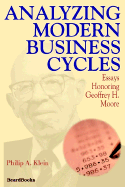|
|
|
|
||||||

|
Analyzing Modern Business Cycles: Essays Honoring Geoffrey H.
Moore By Philip Klein 2002/08 - Beard Books 1587981246 - Paperback - Reprint - 328 pp. US$34.95 Interesting and informative reading for all students of economics and business and for anyone fascinated with the twists and turns of economic cycles in the business world. Publisher Comments
This impressive book is a collection of essays written in honor of Geoffrey H. Moore, Director of Research at the Bureau of Economic Research, on the occasion of his 75th birthday. The essays represent a wide variety of subjects dealing with the vicissitudes of business cycles by a stellar group of economists who were influenced by Moore's analysis of business cycles. Many of the essays deal with specific types of forecasting problems; some consider ways in which indicators and indicator systems can be improved; and others illustrate how indicators and indicator systems can be applied to a representative group of theoretical and policy problems. No book reviews available.
|
|||||||||||||||||||||||||||||||||||||||||||||||||||||||||||||||||||||||||||||||||||||||||||||||||||||||||||||||||||||||||||||||||||||||||||||||||||||||||||||||||||||||||||||||||||||||||||||||||||||||||||||||||||||||||||||||||
|
|
|
home
| about us
| contact us
| related
sites |